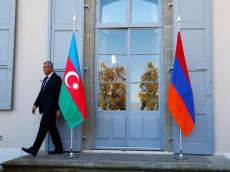|
|
TODAY.AZ / Analytics
Behind closed doors: What CIS meeting mean for peace talks? [COMMENTARY]
08 October 2024 [19:45] - TODAY.AZ

As previously reported, Russian President Vladimir Putin held a meeting with Azerbaijani President Ilham Aliyev in the Kremlin prior to the CIS summit, while a bilateral meeting with Armenian Prime Minister Nikol Pashinyan is ongoing. President Aliyev highlighted that his meeting with Putin "provides a good opportunity to revisit the agenda and determine specific steps" for implementing agreements between their countries. With these talks, how crucial could this be for advancing peace between Azerbaijan and Armenia, especially with the peace agreement potentially being finalized by COP29?
Political commentator Farhad Mammadov, Director of the South Caucasus Research Centre, shared his insight on the matter.
"Concerning the CIS summit, there was an opportunity for meetings between the leaders of Russia, Azerbaijan, and Armenia. It is unlikely that a three-way meeting will take place because Armenia opposes Russia's mediation, while Azerbaijan prefers one-on-one talks. Russia's recent actions could be interpreted as a response to the U.S., which has been actively arranging meetings, first in Washington and then in New York. The U.S. did not only offer a peace venue, but it also showed participation in the process. Though Moscow has a notable advantage in the process. Given Russia's history in tripartite declarations, especially concerning communication channels with Armenia and Azerbaijan, it may seek to maintain a role in the peace process if progress works to its advantage. Otherwise, the process will continue without significant Russian involvement."
It is worth noting one issue: before the meeting, Armenia refused to sign the statements of the Council of Foreign Ministers of the CIS. The Armenian side has yet to disclose the reasons behind this decision. Additionally, throughout the day, Pashinyan posted a series of non-serious posts from Moscow, which appeared to carry a subtle political message. While these gestures may seem trivial, in diplomatic language, they can be interpreted as signals of discontent or defiance. As for now, Pashinyan’s recent behaviour suggests underlying tensions, which could complicate the road to a peace agreement, but the window for diplomacy remains open.
URL: http://www.today.az/news/analytics/253844.html
 Print version
Print version
Connect with us. Get latest news and updates.
See Also
- 09 April 2025 [13:11]
From crisis to cooperation: Azerbaijan’s role in Turkiye-Israel rapprochement - 04 April 2025 [20:16]
Pezeshkian’s visit to Baku comes at critical time for Azerbaijan-Iran relations - 03 April 2025 [20:12]
How Donald Trump’s tariff impacts Azerbaijan’s trade with US [COMMENTARY] - 03 April 2025 [08:30]
Azerbaijan, Germany forge stronger ties in trade, energy, and peace-building - 02 April 2025 [17:56]
Azerbaijan represented at Int'l Theater Week in Uzbekistan - 27 March 2025 [17:25]
Azerbaijan leverages natural advantages for export success through boosting cotton sector - 25 March 2025 [15:15]
China steps up as new leader in global climate governance - 19 March 2025 [14:05]
US-Israel-Azerbaijan partnership to shape regional dynamics amid peace efforts - 19 March 2025 [10:44]
Athletes impress everyone with breathtaking performances - 19 March 2025 [08:30]
Azerbaijan's ongoing restoration efforts: Glimpse into revival of Aghdara
Most Popular
 Macron's fears are starting to come true
Macron's fears are starting to come true
 Siemens launches CAD$150 million AI R&D Center in Canada to revolutionize battery production
Siemens launches CAD$150 million AI R&D Center in Canada to revolutionize battery production
 Now he's selling people, too. Macron has broken another bottom
Now he's selling people, too. Macron has broken another bottom
 If we're going to join, then in a big way: NASA is waiting for an Armenian application!
If we're going to join, then in a big way: NASA is waiting for an Armenian application!
 Armenian forces open fire on Azerbaijani Army positions from multiple directions
Armenian forces open fire on Azerbaijani Army positions from multiple directions
 Azerbaijan honors 119 years of Molla Nasreddin satirical magazine
Azerbaijan honors 119 years of Molla Nasreddin satirical magazine
 Trial of Armenian-origin individuals accused of war crimes continues in Baku
Trial of Armenian-origin individuals accused of war crimes continues in Baku
